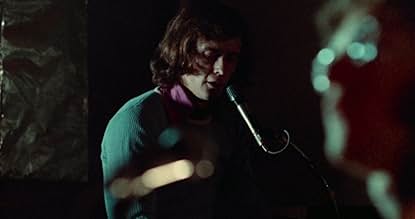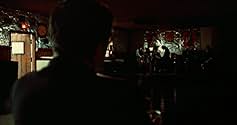PUNTUACIÓN EN IMDb
6,1/10
493
TU PUNTUACIÓN
Arthur y Gerrie Mason, cómodos habitantes de los suburbios de Nueva York, se enteran de que su aparentemente inocente hija adolescente Maxie es drogadicta.Arthur y Gerrie Mason, cómodos habitantes de los suburbios de Nueva York, se enteran de que su aparentemente inocente hija adolescente Maxie es drogadicta.Arthur y Gerrie Mason, cómodos habitantes de los suburbios de Nueva York, se enteran de que su aparentemente inocente hija adolescente Maxie es drogadicta.
Anthony D. Call
- Dr. Lauren
- (as Anthony Call)
Janet Sarno
- Night Nurse
- (as Jan Sarno)
Reseñas destacadas
Sadly Eli's overacting and completely preposterous reactions to every single thing that happened wore extremely thin pretty rapidly. It's too bad because there's many things that work in this film. The music is very good and there's some very powerful scenes of confrontation and honesty. Seems to lose it's direction from time to time but eventually finds it's way back on track. It's easy to say these are messed up people, and maybe they are. But it was common and new and there was no frame of reference for people to cope with these issues. The neighbor's weren't any better. Parents are rarely ever portrayed realistically in movie throughout the decades. In this film the fathers were more over the top in their knee jerk reactions. The mothers were sympathetic and I did feel for them. The young adults were all excellent and once again I should say that the music was appropriate and absorbing. I can see why it garnered the praise it did and it's not nearly as dated as others from this era. This could have been a solid 6 or even a 7 if it wasn't for Eli's dundering incompetence. He should stick to westerns where his stilted dialogue delivery is easier to overlook. Editing was okay and the mood was consistent for the most part.
unfortunately, the only treasured memory I have of this film is the fully nude hairy biker descending the stairs...I saw the SNEAK PREVIEW Of this movie in 1970, when I was ten, accompanied by my parents and my mother's 84 year old childhood governess. I can say that it was electrifying to me at that age to see a middle-class home thrown into chaos by naked tripping hippies. The governess did not have any comment, but what she must have been thinking...I always wondered if the male nude scene was later cut for general release, and if so was I privileged enough to see the DIRECTOR'S CUT with my parents and the governess...this would still be a fairly shocking film if seen today. needs a DVD release.
The People Next Door captures the spirit of it's age in a way few other films of it's era have. Eli Walach and Julie Harris are two of the greatest actors of our time and play remarkably well together. Just check out the last few scenes of this movie. Their performances help keep this film from becoming dated. The subject matter is touchy stuff. It deals with teenage alienation, rebellion and trust. Many films of this era are somewhat tongue in cheek, this movie however never lets up. It takes itself very seriously and as a result has often been misunderstood. The music is cool and so is the rest of the cast. This is a must see for anyone interested in forgotten classics of the early seventies.
"The People Next Door" is an exploitation movie masquerading as an important social document. The cast, photography and production promise "class", while the script, direction and execution scream "cash-in".
Comfortable New York suburbanites Arthur and Gerrie Mason (Eli Wallach and Julie Harris) discover one night that their seemingly perfect 16-year old daughter, Maxie (Deborah Winters) has been tripping on LSD. Arthur, a smug, bullying braggart, immediately suspects his 17-year old (long-haired) son, Artie (Stephen McHattie) of supplying the drug to his sister, and kicks him out of the house. Whereupon, (suitably) confused Harris runs next door to seek advice from high school principal David Hoffman (Hal Holbrook) whose wife, Tina (a pre-"Phyllis" Cloris Leachman) is an alcoholic, and whose son Sandy (Don Scardino) has his own problems. Very sensibly, he advises love and understanding on the part of the parents, which all but goes out the window when Maxie confesses she has been tripping for quite a while now, is also sexually active and on THE PILL. Naturally,she just keeps getting worse--she's found by her father high on cocaine and in bed with a biker. From there, it's straight to family therapy where, among other things, it's revealed that Dad is having an affair with his lusty secretary (a pre-"Golden Girl" Rue McClanahan) and Mom knew it all the time. After another lamentably useless (and unintentionally hilarious) therapy session, the Masons decide to throw a party(?) which comes to an abrupt halt when one of the hired musicians is discovered puffing pot. Maxie then gets hold of more LSD, does a nude dance on her lawn and trips herself into a seedy mental hospital. The sight of her near-catatonic daughter in this horrible place drives Mom right to bed, where she remains until the film's climax.
More a catalog of just about every ailment bedeviling middle class families in the seventies than a worthwhile attempt at explaining them, "The People Next Door" lurches from one crisis to the next with very little happening in between. That's a shame, because the cast is excellent, but trapped in parts which are less like flesh and blood characters in a drama, than stereotypes in a ''Saturday Night Live'' sketch. For example, Wallach hypocritically swallows massive amounts of sleeping pills, Harris chain-smokes her way through the story, and all involved are on edge from beginning to end. Along the way, McHattie heads a rock band (dubbed by short-lived group, The Bead Game) principal Holbrook must deal with a student riot, and Wallach gooses Leachman when the opportunity arises. Yes, The movie gives you your money's worth in 93 minutes, that's for sure, but those who are wondering what the point is, will never find out. At least most B movies don't attempt to hide behind ''artistic'' pretensions.
Comfortable New York suburbanites Arthur and Gerrie Mason (Eli Wallach and Julie Harris) discover one night that their seemingly perfect 16-year old daughter, Maxie (Deborah Winters) has been tripping on LSD. Arthur, a smug, bullying braggart, immediately suspects his 17-year old (long-haired) son, Artie (Stephen McHattie) of supplying the drug to his sister, and kicks him out of the house. Whereupon, (suitably) confused Harris runs next door to seek advice from high school principal David Hoffman (Hal Holbrook) whose wife, Tina (a pre-"Phyllis" Cloris Leachman) is an alcoholic, and whose son Sandy (Don Scardino) has his own problems. Very sensibly, he advises love and understanding on the part of the parents, which all but goes out the window when Maxie confesses she has been tripping for quite a while now, is also sexually active and on THE PILL. Naturally,she just keeps getting worse--she's found by her father high on cocaine and in bed with a biker. From there, it's straight to family therapy where, among other things, it's revealed that Dad is having an affair with his lusty secretary (a pre-"Golden Girl" Rue McClanahan) and Mom knew it all the time. After another lamentably useless (and unintentionally hilarious) therapy session, the Masons decide to throw a party(?) which comes to an abrupt halt when one of the hired musicians is discovered puffing pot. Maxie then gets hold of more LSD, does a nude dance on her lawn and trips herself into a seedy mental hospital. The sight of her near-catatonic daughter in this horrible place drives Mom right to bed, where she remains until the film's climax.
More a catalog of just about every ailment bedeviling middle class families in the seventies than a worthwhile attempt at explaining them, "The People Next Door" lurches from one crisis to the next with very little happening in between. That's a shame, because the cast is excellent, but trapped in parts which are less like flesh and blood characters in a drama, than stereotypes in a ''Saturday Night Live'' sketch. For example, Wallach hypocritically swallows massive amounts of sleeping pills, Harris chain-smokes her way through the story, and all involved are on edge from beginning to end. Along the way, McHattie heads a rock band (dubbed by short-lived group, The Bead Game) principal Holbrook must deal with a student riot, and Wallach gooses Leachman when the opportunity arises. Yes, The movie gives you your money's worth in 93 minutes, that's for sure, but those who are wondering what the point is, will never find out. At least most B movies don't attempt to hide behind ''artistic'' pretensions.
Theatrical remake of a well-regarded 1968 "CBS Playhouse" special for television about the secret drug-life of today's suburban teenagers was directed both times by David Greene, who practically disowned this franker, R-rated version. The problem could be in the central casting: Eli Wallach pushes far too hard as the clueless father of a tripping 16-year-old girl while mom Julie Harris smokes and looks distraught (when her daughter tells her she's on the Pill, Harris hilariously responds, "I think I'm losing my mind!"). The original rock songs (performed by The Bead Game and The Glass Bottle) are dreadfully pedagogic--hoping to 'inform' us with their lyrics--but, since nobody can reach this alienated girl, what good is it probing her inner-thoughts to music? Generation Gap tale has a solid cast (including Hal Holbrook, Cloris Leachman, Rue McClanahan, Stephen McHattie, Don Scardino, newcomer Deborah Winters, and Rutanya Alda as a pixilated nurse), yet the pitch of the film is off, hysterical instead of riveting. ** from ****
¿Sabías que...?
- CuriosidadesDavid Greene thought that the final cut of the film was so distorted that he tried, without success, to have his name removed from the credits.
- Citas
Old couple's son: [to father] You are a shit! Why don't you just go away someplace and die? Just die!
- ConexionesFeatured in Classroom Scare Films Vol. 5: More Drug Evils (1997)
- Banda sonoraMama, Don't You Wait Up for Me
Written by Scott English (as Scott David English) and Larry Weiss
Sung by The Glass Bottle
Selecciones populares
Inicia sesión para calificar y añadir a tu lista para recibir recomendaciones personalizadas
- How long is The People Next Door?Con tecnología de Alexa
Detalles
Taquilla
- Recaudación en Estados Unidos y Canadá
- 217.510 US$
Contribuir a esta página
Sugerir un cambio o añadir el contenido que falta





























